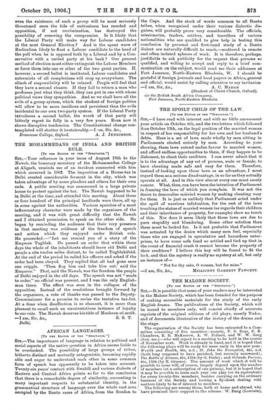THE MOHAMMEDANS OF INDIA AND BRITISH RULE.
[To THE EDITOR OF THZ "SPECTATOR."]
Sra,—Your reference in your issue of August 18th to the Nawab, the honorary secretary of the Mohammedan College at Aligarh, reminds me of an incident connected with him which occurred in 190. The imposition of a House-tax in Delhi created considerable ferment in the city, which was taken advantage of by some pleaders and others for their own ends. A. public meeting was summoned in a large private house to protest against the tax. The Nawab happened to be in Delhi at the time, and attended this meeting. About three or four hundred of the principal landlords were there, all up in arms against the authorities. Various speeches of a most inflammatory character were made by the organisers of the meeting, and it was with great difficulty that the Nawab and I obtained permission to speak on the other side. He began by reminding the audience that their very presence in that meeting was evidence of the freedom of speech and action which they enjoyed under British rule. He proceeded :—" Let me remind you of a story of the Emperor Tughlak. He passed an order that within three days the whole of the inhabitants should leave old Delhi and people a site twelve miles distant, to be called Tughlukabid. At the end of the period be called his officers and asked if the order had been obeyed. They replied that all had gone save one cripple. 'Then flog him and take him out,' said the Emperor." That, said the Nawab, was the freedom the people of Delhi enjoyed in the old days. The speech was not "made to order," no official was present, and I was the only English- man there. The effect was seen in the collapse of the opposition. Instead of the resolutions brought forward by the organisers, a vote of thanks was passed to the Deputy- Commissioner for a promise to revise the tentative tax-list. At a time when disaffection is so clamant, it is more than pleasant to recall such an unostentatious instance of loyalty to our rule. The Nawab deserves his title of Moohsunail-mulk.














































 Previous page
Previous page